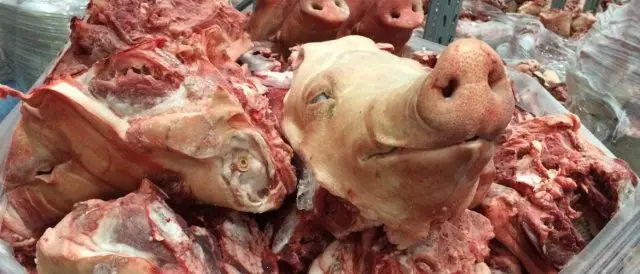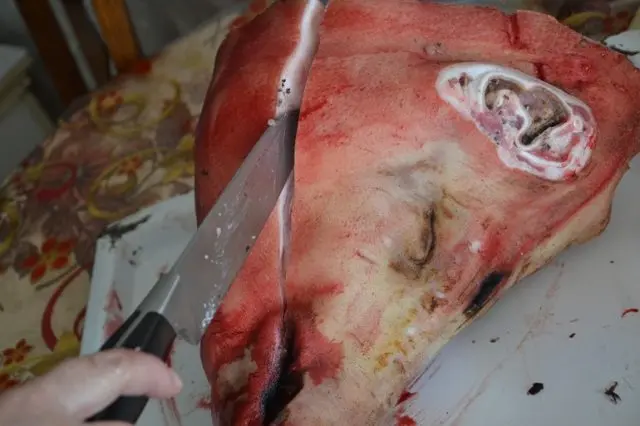Contents
After the slaughter of the pig, its head is first separated, after which the carcass is sent for further processing. Cutting a pig’s head requires accuracy. A novice farmer must take a responsible approach to this process in order to avoid possible spoilage of meat and offal.
Preparation of tools and workplace
The most important basics are the right place and the table on which the deboning process will take place. Butchering a pig’s head at home should take place in a clean room. The table for her should be large and stable. Also for deboning you will need:
- several cutting boards of different sizes;
- deep bowls for laying out products;
- sharp knives – kitchen, sirloin with a rigid blade, as well as a cleaver with a thick butt;
- paper towels or clean cloth;
- medical gloves;
- running water.
The need to use several knives is due to the specifics of cutting the head. For example, a cleaver is used to cut the skull. A sirloin knife is used directly for skinning meat.
How to butcher a pig’s head without an ax
The first step is to clean off the soot formed during the singeing of the piglet from the ears and other parts of the head. At this stage, you should not wash your hair – dry skin will allow you to more conveniently separate the outer parts when cutting. The step-by-step process of cutting a pig’s head is traditionally performed in the following sequence:
- Ears are cut off with a sharp knife. Care must be taken to keep the cutting line as close to the skull as possible. Pig ears are widely used in cooking for preparing various appetizers and salads. Ears cooked in Korean marinade are very popular. One of the best options for using them is smoking – the resulting dish is considered a real delicacy.
- The next step is cutting off the cheek. It is separated with the same knife along with the meat adjacent to it. The cut is considered correct from the top of the head towards the patch. The knife should pass as close as possible to the skull, but without touching it. Particular care should be taken near the eye sockets – their accidental damage can lead to eye fluid getting on the meat. The cheek is used to prepare various snacks – smoked, boiled and pickled. Many housewives bake it in the oven with vegetables.
- The head is placed on the table with a frame, after which the meat is removed from the frontal part. Such meat can be used for minced meat in combination with other parts of the pork carcass – shoulder or neck.
- Now we need to separate the language. To do this, turn the head over, cut off the pulp from the chin. The tongue is taken out of the resulting hole. There are a large number of dishes that are prepared with this part of the pig. The tongue is stewed, fried, boiled and marinated. It is added to salads and appetizers. Aspic, made from pork tongue, is considered a real work of culinary art.
- The next step is cutting the pig’s head in half. To do this, with a cleaver, a strong blow is applied to the area of uXNUMXbuXNUMXbthe bridge of the nose. Then the bones are cut with a sharp knife, separating the upper part of the head from the lower one.
- The eyes are removed from the top. Then, with a sharp knife, the brain is cut out, which must be washed in clean water. The brain is most often used in the preparation of various pâtés.
- Cut off a patch. It is used in cooking for the preparation of jelly and saltison. Housewives also stew it with vegetables and add it to casseroles.
- To separate the jaws, it is necessary to cut the ligament connecting them. The bones on which the meat remains are separated from the lower part. They are perfect for making rich broths and soups.

The blanks obtained during the cutting of the pig’s head must be treated with special care. It is believed that it is necessary to cook from them immediately after deboning. If the by-products are harvested for the future, it is necessary to soak them in cold water for 6 hours, then wipe them with paper towels.
How to butcher a pig’s head for jelly
The most popular dish cooked by housewives from a pig’s head is jellied meat. This part of the pig contains a large amount of cartilage and skin, which, when cooked for a long time, actively secrete collagen, a substance necessary for the solidification of the broth. Ears and snout are the parts from which collagen comes out the fastest. Often they are added separately when cooking jellied meat from a ham or shank.
Cooking jellied pork head requires a responsible approach to the preparation of ingredients. Initially, you need to soak your head in water for a long time. The ideal condition would be to keep it in water for 12 hours. Then it is wiped dry and proceed to cutting.

It is necessary to remove the parts unsuitable for cooking jelly in advance. These include eyes and teeth. The eyes are removed with a spoon, being careful not to damage the integrity of the eye membrane. Teeth are removed with pliers or cut out along with the jaws.
First, a patch and ears are cut off from the head. Then it is cut into two equal parts between the eyes. Then each of the resulting parts should be divided into two more. For jelly, the strict division into the cheek, the frontal part, and so on is not important. The main condition for cutting a pig’s head into jelly is the need for approximately the same size of the pieces. Each of the pieces should end up with a size of 8-10 cm. This approach will allow you to get the perfect broth.
Conclusion
Butchering a pig’s head is a simple process. Subject to all the rules, a rather large amount of meat and offal is obtained, which can be used to prepare a large number of culinary delights. If the head is cut for jelly, then the process does not present any difficulties at all.









